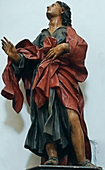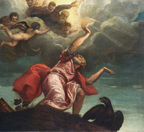He was the only apostle at the foot of the cross during Christ's crucifixion and was the one to whom the care of the Virgin Mary was entrusted by Jesus Christ himself. John's life following the death and resurrection of Jesus Christ was quite long, with most estimating he died in 100 A.D. at the age of 93. As such he made many contributions to the establishment of Christianity in Asia and about the Mediterranean. So critical was he to the early work of the Church that Paul called him, along with James the Just, the pillars of the Church. Initially, because of his assignment to care for Jesus's mother, it is thought that John stayed with Mary. After her assumption, he went to Ephesus where he wrote at least two Epistles, eventually making his way to Asia where Irenaeus in Against Heresies placed him "until the time of Trajan" (between 96-117 A.D.). John also spent some time in Greece, apparently with one of the great Christian fathers, Polycarp, whom he taught. Polycarp tells a story that took place when he was in a bathhouse with John in Ephesus. Apparently, the two had a close encounter with a Greek heretic named Cerinthus. Cerinthus apparently wrote the now lost "Gospel of Cerinthus" where he argued that that the kingdom of Christ was to be established on earth and that the flesh "would again be subject to desires and pleasures." Eusebius, Church History, Bk III, Ch. 28, ¶ 2. He also claimed that Jesus was not born of a virgin and that he was merely a man. The heresies were findamentally offensive to the early Christians because they attempted to rob Christ of his divinity and suggested that God was not the creator of the physical world. According to Polycarp when John learned that Cerinthus was at the bathhouse where they were, he immediately fled "for he could not bear being in the same roof with him." Church History, Bk III, Ch. 28, ¶ 6. There are reports that Emperor Domitian, who reigned over the Roman Empire between 81 A.D. and 96 A.D., persecuted Christians and Jews alike. Of course, John was both. Eusebius tells that Domitian at one point called for John to be burned in oil, an attempted execution that was indeed carried out. It had the opposite effect, however, when John survived, and everyone in the coliseum who witnessed the failed murder converted to Christianity. Frustrated in his attempt to execute John, Domitian exiled him to the Island of Patmos in the Aegean where John received the Revelation that became the last book of the New Testament.
The accusations were threatening to Domitian, who thought this sect was going to threaten his reign and thus ordered for the Christians to be rounded up and executed. Some of Domitian's centurions made their way to Ephesus where they heard of John and captured him at his home. He was brought to Rome where John explained Christianity to the emperor, but Domitian remained unmoved, claiming that he needed proof. John suggested that Domitian give him poison to drink so Domitian could see that it could not hurt him. Agreeing to the test, Domitian had his men bring the poison to John who drank it after praying for the Lord's protection. John survived, leading Domitian to claim that the whole thing had been faked. In reply, John suggested that they try the poison on a condemned prisoner to prove its efficacy. This, the emperor did, and upon drinking the poison, the prisoner promptly died. When the king remained unmoved and ordered the prisoner's body disposed, John became indignant and resuscitated the prisoner, instructing him to give thanks to God who had delivered him from prison and death. Domitian, seeing that he could not kill John, ordered him banished to Patmos. After Domitian's assassination in 96 A.D., he was succeeded by Nerva, who welcomed all banished Christians. John thus returned to Ephesus where he continued his work of evangelization. Church History, Bk III Ch. 20. ¶ 10-11. One interesting event that took place in a city near Ephesus relates to the commitment of a youngster by John to the care of the local bishop. Trained in the faith, the young man nevertheless became corrupted by some other youngsters to the point where he engaged in repeated acts of robbery. He eventually became so immersed in the ways of sin and immorality that he left the faith and, according to Clement of Alexandria, entered a gang where he committed "greater crime[s]". Some time later, John returned to that city on an unrelated matter and asked the bishop about the youngster. "He is dead," the bishop said, to which John asked, "How and what kind of death?" "He is dead to God for he turned wicked and abandoned, and became at least a robber. And now, instead of the Church, he haunts the mountain with a band like himself." Upon hearing the news, the Son of Thunder, who by this time was in his 80s, demanded a horse and rode to the mountain where the members of the youngster’s gang took him captive. Insisting that he be taken to their captain, John found the young man who, upon seeing the elder John approach, turned to flee. John immediately ran after him, "forgetting his age," and yelled, "Why, my son, do you flee from me, your own father, unarmed, aged? Pity me, my son; fear not; you have still hope for life. I will give account to Christ for you. If need be I will willingly endure your death as the Lord suffered death for us. For you will I give up my life. Stand, believe Christ has sent me." The remainder of the story as related by Clement through Eusebius is particularly gripping and emblematic of the devotion of John:
John is buried in Ephesus. His tomb is in the Basilica of St. John at Selçuk.
Help support the publication of more articles like these. Donate to The Federalist Pages, or Join The Founding Fathers Club. Read more from our Christianity Series by visiting thefederalistpages/news. Dr. Julio Gonzalez is an orthopaedic surgeon and lawyer living in Venice, Florida. He served in the Florida House of Representatives. He is the author of numerous books including The Federalist Pages, The Case for Free Market Healthcare, and Coronalessons. He is available for appearances and book signings, and can be reached through www.thefederalistpages.com.
2 Comments
Emilio
3/14/2021 07:17:43 am
I am following your writings and find them enlightening, educational, and inspirational. Thank you.
Reply
Julio Gonzalez
3/21/2021 05:39:08 am
Thank you, Emilio. Thank you for all your kindness.
Reply
Leave a Reply. |
Details
AuthorWrite something about yourself. No need to be fancy, just an overview. Archives
July 2021
Categories
All
|


 RSS Feed
RSS Feed